A fresh appraisal of Giacometti's output, from painting to sculpture
This comprehensive survey of the work of the Swiss-born modern master
Alberto Giacometti offers a fresh and incisive account of his creative
output. Published on the occasion of Giacometti's first major museum
presentation in the US in over a decade, the volume brings together
nearly 200 sculptures, paintings and drawings to trace the artist's
wide-ranging and hugely innovative engagement with the human form across
various mediums.
While Giacometti may be best known for his distinct figurative
sculptures that emerged after World War II, including a series of
elongated standing women, striding men and expressive busts, this volume
devotes equal attention to the artist's early and midcareer development.
It explores his lesser-known engagement with Cubism and Surrealism as
well as African, Oceanic and Cycladic art, while also highlighting his
remarkable talents as a draftsman and painter alongside his sculptural
oeuvre. Of particular focus is Giacometti's studio practice, which is
examined through rarely seen plaster sculptures that highlight the
artist's working process, in addition to historical photographs
documenting his relationship with the Solomon R. Guggenheim
Museum--which hosted the artist's first US museum exhibition, in
1955--and with New York City.
Alberto Giacometti was born in Borgonovo, Switzerland, in 1901. In
1922, Giacometti settled in Paris, and began to exhibit his sculptures.
By 1930 he was a participant in the Surrealist circle, up until
1934--also the year that he first exhibited in the US, at the legendary
Julien Levy Gallery in New York. From 1942, Giacometti lived in Geneva,
where he associated with the publisher Albert Skira. In 1948, he was
given a solo show at the Pierre Matisse Gallery, New York. In 1955, he
received retrospectives at the Arts Council Gallery, London, and the
Solomon R. Guggenheim Museum, New York. He received the Sculpture Prize
at the 1961 Carnegie International in Pittsburgh. In 1965, retrospective
exhibitions were organized by the Tate Gallery, London, The Museum of
Modern Art, New York, and the Stedelijk Museum, Amsterdam. Giacometti
died in 1966.

